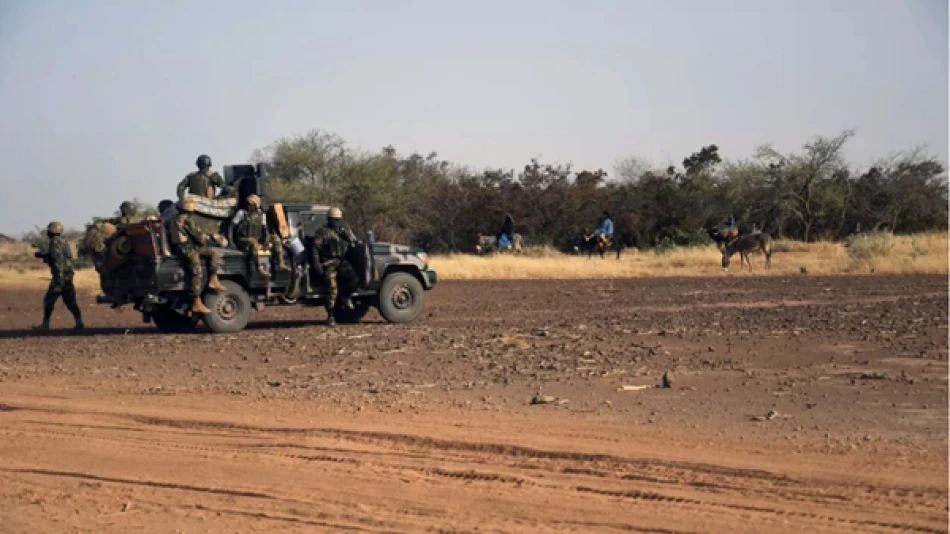
Horrific Massacre Leaves 20 Dead in Niger, Highlighting Escalating Violence
Niger Gold Mine Massacre: Armed Groups Kill 20 Civilians in Latest Sahel Security Crisis
Twenty civilians traveling by truck were gunned down by armed militants near Niger's Komabango gold mining area on Thursday, highlighting the deteriorating security situation across West Africa's Sahel region. The systematic execution-style killings underscore how terrorist groups are expanding their territorial control and targeting economic lifelines in one of the world's most volatile regions.
The Attack: Calculated Violence in Mining Territory
Armed groups intercepted a commercial truck returning from the market in Mehenna town, forcing all passengers to disembark near the Komabango gold mine site. In what local sources describe as a methodical execution, the attackers separated 19 men from the group, forced them to the ground, and opened fire. The truck driver was also killed, and the vehicle was set ablaze. Only two women and two other passengers managed to escape.
The attack's proximity to gold mining operations suggests these groups are deliberately targeting Niger's extractive industries, which represent crucial economic infrastructure for both local communities and the national economy.
Strategic Location Amplifies Regional Concerns
The Tri-Border Triangle Hotspot
The massacre occurred in Niger's Tillaberi region, part of the notorious tri-border area where Niger, Mali, and Burkina Faso converge. This zone has become a stronghold for affiliates of both Al-Qaeda and Islamic State, who exploit porous borders and weak state presence to establish operational bases.
Unlike isolated terrorist incidents, this attack represents a broader pattern of territorial consolidation by jihadist groups who now control significant swaths of the Sahel. The systematic nature of the killings—separating victims by gender and executing men while sparing women—follows operational patterns seen across the region.
Economic Warfare: Targeting Niger's Gold Resources
The choice to attack near Komabango's gold mining area reflects a strategic shift in how terrorist groups operate in the Sahel. Rather than purely ideological violence, these organizations increasingly target economic infrastructure to:
Control revenue streams: Gold mining provides both legitimate income for communities and potential funding for armed groups through taxation or direct control.
Disrupt state capacity: By making mining areas unsafe, groups undermine government revenue and local employment, creating conditions for further recruitment.
Establish territorial authority: Controlling movement around economic sites demonstrates power and challenges state sovereignty.
Regional Implications for Sahel Stability
This attack comes as Niger faces unprecedented political and security challenges following military coups across the Sahel. With French forces withdrawing from the region and traditional Western partnerships strained, security vacuums are expanding rapidly.
The systematic targeting of civilians traveling for economic purposes—market trips, mining work—represents an escalation that could further isolate rural communities and accelerate economic collapse in border regions. This creates a vicious cycle where state weakness enables more terrorist control, which in turn generates more instability.
What This Means for Regional Security Architecture
The Komabango massacre signals that terrorist groups in the Sahel have moved beyond hit-and-run tactics to systematic territorial control. For international observers, this suggests that current counter-terrorism approaches—focused on military interventions rather than governance and economic development—are failing to address root causes.
With Niger's military government seeking new security partnerships, potentially with Russia, this incident may accelerate shifts away from Western-led counter-terrorism frameworks toward alternative security arrangements. However, the fundamental challenge remains: how to provide security and economic opportunity in remote areas where state presence has historically been minimal.
The targeting of gold mining areas specifically indicates that future security strategies must protect economic infrastructure as a priority, not just population centers. Without secure access to mining and agricultural areas, rural communities face a stark choice between economic survival and physical safety—a dynamic that ultimately benefits terrorist recruitment efforts.
Most Viewed News

 Layla Al Mansoori
Layla Al Mansoori






